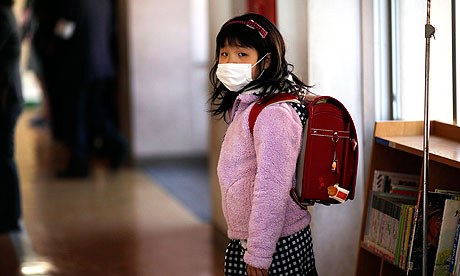
Furious parents in Fukushima have delivered a bag of radioactive playground earth to education officials in protest at moves to weaken nuclear safety standards in schools.
Children can now be exposed to 20 times more radiation than was previously permissible. The new regulations have prompted outcry. A senior adviser resigned and the prime minister, Naoto Kan, was criticised by politicians from his own party.
Ministers have defended the increase in the acceptable safety level from 1 to 20 millisieverts per year as a necessary measure to guarantee the education of hundreds of thousands of children in Fukushima prefecture, location of the nuclear plant that suffered a partial meltdown and several explosions after the earthquake and tsunami on 11 March.
It is estimated that 75% of Fukushima's schools may have radiation levels above the old safety level of 1 millisievert. The local authorities in Koriyama have tried to ease the problem by digging up the top layer of soil in school and day centre playgrounds, but residents near the proposed dump site have objected.
The new standard of 20 millisieverts a year – equivalent to the annual maximum dose for German nuclear workers – will mean those schools remain open, but parents and nuclear opponents are angry that safety concerns are being ignored.
A group claiming to represent 250 parents in Fukushima visited the upper house of parliament and presented government officials with a bag of radioactive dirt from the playground of one of the affected schools. A geiger counter clicked over it with a reading of 38 millisieverts.
"How dare they tell us it is safe for our children," said Sachiko Satou of the Protect Fukushima Children from Radiation Association. "This is disgusting. They can't play outside with such risks. If the government won't remove the radioactive dirt then we'll do it ourselves and dump it outside the headquarters of Tokyo Electric."
Greenpeace, Friends of the Earth and other environment and anti-nuclear groups submitted a petition against the regulations. They accused the Nuclear Safety Commission of meekly accepting the new safety limit after just two hours of closed-door discussions with government officials.
However, representatives of the commission denied agreeing that 20 millisieverts was safe. Education ministry officials fudged demands for an explanation. "I think 20 millisieverts is safe but I don't think it's good," said Itaru Watanabe of the education ministry, drawing howls of derision from the audience of participants. He promised the government would carefully monitor the situation and do all it could to get radioactivity down to 1 millisievert.
The health impacts are disputed. Physicians for Social Responsibility – a US-based Nobel prize winning organisation that opposes nuclear power – said children were more vulnerable than adults. It said the new acceptable limit exposed children to a one in 200 risk of getting cancer, compared with a one in 500 risk for adults.
"It is unconscionable to increase the allowable dose for children to 20 millisieverts," the group said in a statement. "There is no way this level of exposure can be considered safe."
This is not the first time the government has shifted safety baselines since the start of the crisis. Permissible levels of radiation exposure for nuclear workers were amended soon after the disaster struck to allow emergency operations at the stricken Fukushima reactor. Several weeks later the cabinet allowed the plant's operator, Tokyo Electric, to violate regulations by dumping 11,500 tonnes of contaminated water into the Pacific. The radioactivity of the discharge was 100 times higher than the acceptable limit. The government says it has to take unprecedented measures to deal with an unprecedented disaster.
Kan has lost one of his chief scientific advisers over the latest decision. Toshiso Kosako – a Tokyo University professor who was called in to help deal with the crisis – walked out on Friday and has since accused the government of ad hoc policy making and contravening internationally accepted norms for the sake of political expediency.
Kan has also come under fire from lawmakers in his ruling Democratic party.
Mori Yuko, an upper house member, said she was disgusted by the decision to loosen the safety limit. "Would politicians and bureaucrats allow their own children to go to a contaminated school," she said. "This makes me furious."
She called for more rigorous and widespread health monitoring of children and criticised an earlier government policy to withhold data about radiation levels and wind direction. After a public outcry these figures are now published daily in newspapers, but the allegations of cover-ups and shifting safety baselines are taking a heavy political toll.
A mere 1.3% of respondents in a weekend poll by the Kyodo news agency thought Kan was exercising sufficient leadership. But many people also criticise the main opposition Liberal Democratic party for lax nuclear regulation while it was in power.

No comments :
Post a Comment